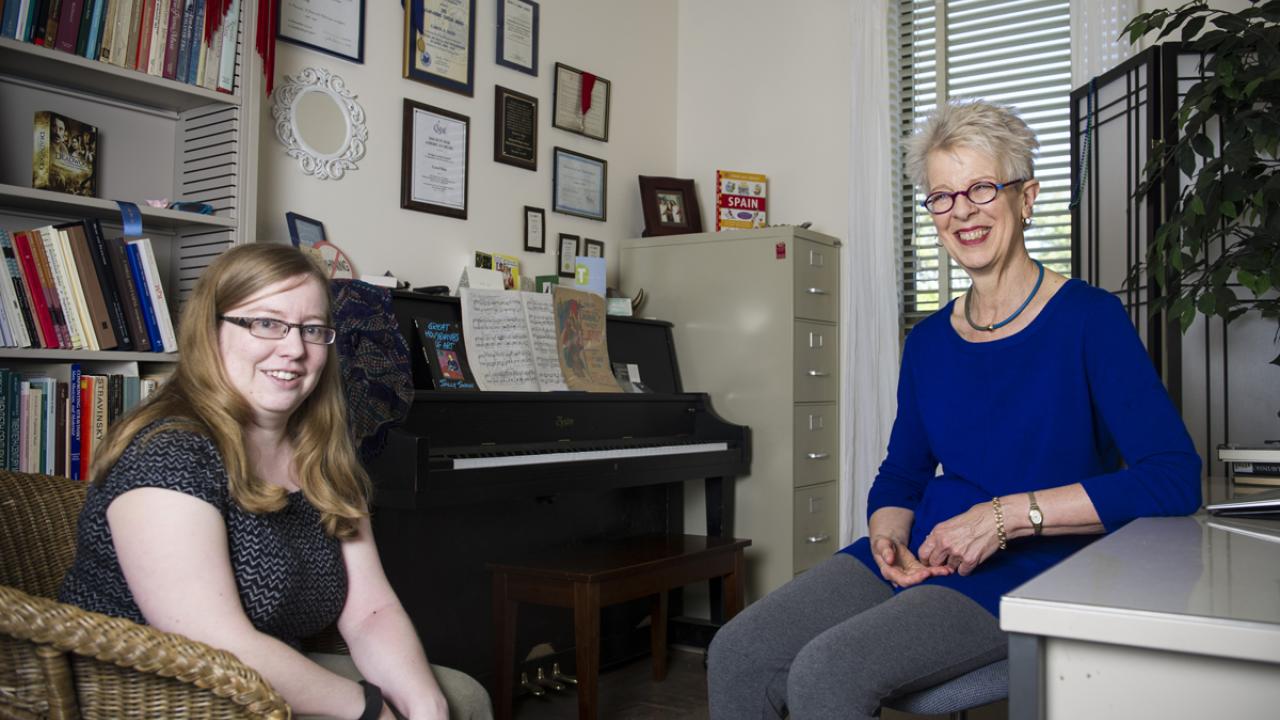
Mentoring Fellowship Awardees - Dr. Carol Hess and Mentee Claire Thompson, Musicology
What makes Dr. Carol Hess a great mentor?
Quick Summary
- Her detailed personal feedback helps mentees improve their writing, teaching, researching, and interpersonal skills.
When UC Davis alum Carol A. Hess was offered a professorship of music at UC Davis, it was little wonder that she was a Target of Excellence hire: In the early 1990s, Hess had been UC Davis’s first PhD in musicology. “I was thrilled to return to such a fine department and to work with PhD students, which I hadn't done in my previous positions,” she says.
Her old stomping grounds, naturally, had matured in the interim. Progressive changes included more faculty and international students, a well-organized graduate program, and a monthly forum for doctoral students to discuss current research and academic career aspirations. However, these changes were at odds with the actual job picture of academic musicology, which had deteriorated due to the 2008 economic recession. “It is improving only slowly,” she comments.
Besides, students in the STEM disciplines tended to have more support, careers, internships, and general opportunities than those in STEAM (“A” standing for “arts”). Hess herself had faced those obstacles as a student. With that in mind, she and Claire Thompson, her dissertation advisee, reshaped and expanded the monthly forum to discuss alternatives to the standard academic career path for music graduate students and explore nonacademic fields such as music librarianship, arts management, music entrepreneurship, and music publishing.
“I feel fortunate that my professional society, the American Musicological Society (AMS), has lately concerned itself with nonacademic careers, surely in light of the current employment situation and the proliferation of adjuncting (which is now a verb) in the academy,” Hess says. In fact, one of Hess’s department colleagues, Professor Christopher Reynolds, was AMS president when the forums were being organized, and he launched the MCT lecture series with his talk "Public Musicology: What Is It?"
These initiatives earned Hess one of the first five inaugural fellowships under the Mentoring at Critical Transitions for her proposal titled “Mentoring for Graduate Students in the Arts.”
Thompson, a fourth-year musicology student, is well aware of the occupational obstacles in her field. “We were learning the ropes at the same time,” Thompson says; she and Hess both arrived in 2012. “After I took a seminar from her and TA’d under her, I knew that our styles were complementary, and asked her to direct my dissertation.”
Hess, previously a freelance musician for whom academia is a second career, knows first-hand the 360-degree value of mentoring, having received solid advice from two professionals in academia post-graduation. Having organized mentoring workshops in previous teaching positions, she knew that encouraging students to think outside the academic box in terms of realistic career opportunities could only be beneficial, as dream jobs don’t always materialize.
From the mentee’s perspective, Thompson agrees that the relationship is a critical factor for success. “It helps to know you have someone on your side fighting for you,” she says. The close collaboration allows a mentor to write detailed recommendations for grant applications, or guide mentees to projects that make the most of their strengths and open up avenues they may not even be aware of (a two-way avenue, Hess adds; she learns from her students as well.)
The talks have revealed a range of professional opportunities Thompson never before considered. But the program itself sharpened and expanded her interpersonal professional skills. “With Carol’s guidance, I have been the main person organizing these talks—communicating with the potential speakers and the music department, scheduling the events, seeing to the speakers’ needs. This has given me practice at something that makes me nervous: interacting and communicating with unknown colleagues in a professional setting. No matter what I end up doing—and despite these talks, I still want to be a professor!—these skills will serve me well.”
Hess lauds Thompson’s work. “She's done a marvelous job organizing all the speakers, introducing them, and in the general administration of the project.”
“Carol is very gracious with her time, despite her heavy research, teaching, and department duties,” Thompson enthuses. “Her detailed personal feedback has helped me improve my writing, teaching, researching and interpersonal skills. She also has a great sense of humor, and her parties frequently end in a group singing show tunes at the piano!”

